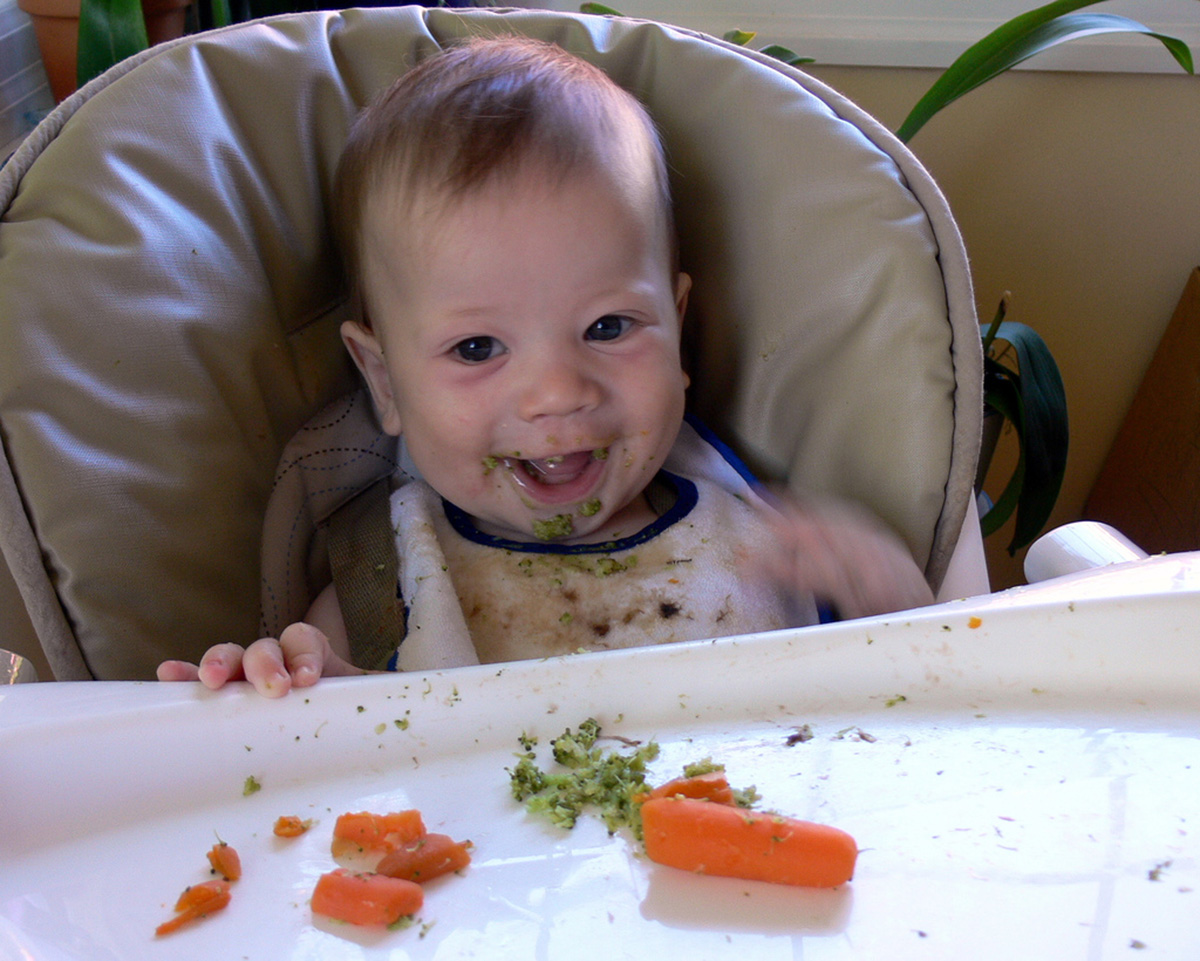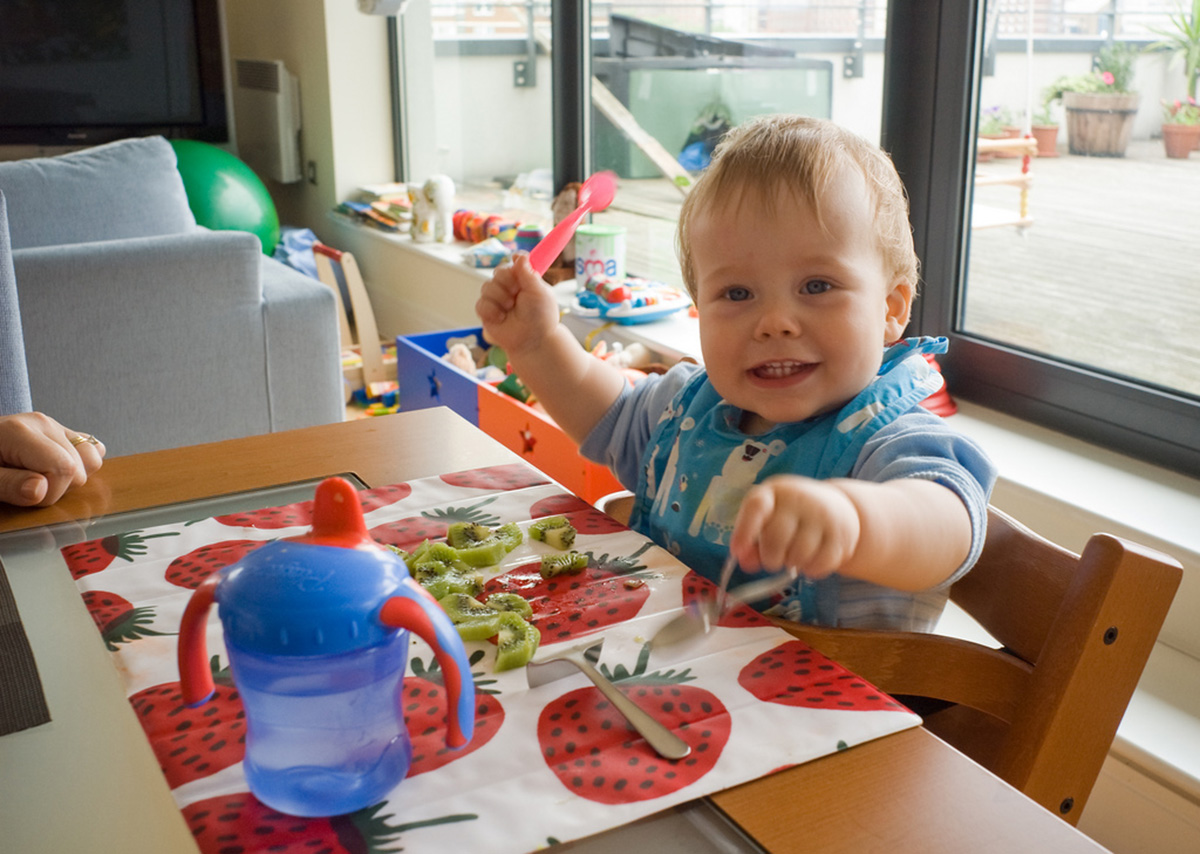A baby-led introduction to solids offers a stress-free approach to getting babies used to non-milk foods — and one that's fun to the baby. What do you need to know about baby-led solids?
Starting your baby on solid foods is a bit of an organizational nightmare: you have to be fully aware of what foods to introduce when, set up a schedule, and essentially arrange your life around your baby's nutritional needs so that they can grow up to be strong and healthy. What's more, babies frequently spit their foods out, making meals a long, drawn-out process. Right?
Well, not necessarily. Baby-led weaning is a term referring to a method that puts your baby solidly — pun absolutely intended — in control of the foods they put into their mouths, and yet is stress-free for you, the parents. Parents who practice baby-led weaning (BLW) offer their babies solid foods when the time is right, but don't stress if they're not too eager. Rather, they'll simply offer their baby food again later. What's more, this method doesn't involve buying expensive baby-food jars or meticulously steaming and pureeing everything you will offer your baby, because you'll be offering your baby finger foods. Yes, it's the easy way out — but also, advocates say, the healthiest thing to do.
When Should You Introduce Solids?
The World Health Organization advises mothers all over the world to breastfeed their babies exclusively — meaning no formula, no water, and no solids, but only breastfeeding — until their babies are six months old. It clearly states that breastfeeding meets all a baby's nutritional needs during these first six months, adding that "it continues to provide up to half or more of a child’s nutritional needs during the second half of the first year, and up to one-third during the second year of life". The American Academy of Pediatrics (AAP) and many other health organizations completely agree with the WHO on this one.
While the current generation of new parents has largely grown on formula and rice cereal introduced as early as four months, the most up-to-date research strongly suggests that it is much better to let a baby's gut mature before introducing solid foods.Giving solids to babies who are not yet able to digest them properly can lead to stomach upsets, gas and constipation.
Waiting until they baby is ready, on the other hand, offers many benefits:
- A greater protection from illness through breastmilk.
- A properly working digestive system.
- A lower risk of obesity in the future.
- Potential protection from iron-deficiency anemia.
- For you, an easier time with the introduction of solids, possible continued lactation ammenorrhea (a lack of menstruation that will protect you from pregnancy if you are breastfeeding exclusively), and easier weight loss due to the calories burned by breastfeeding.
Solids: Signs Your Baby Is Ready
While six months currently appears to be the optimal age for the introduction of solid foods, babies don't function in accordance with a strict time table. Some will be ready slightly earlier, while others will not show signs of readiness until a little later. Your baby will give you the right clues. Babies who can sit up independently, show an interest in solid foods, have lost that tongue-thrust reflex that cause them to automatucally spit out solid foods, and have a pincher grip that allows them to grab onto foods themselves may be ready for solids. Babies who are ready for solid foods are eager and able to hold foods in their mouths, chew them and swallow, and they will naturally be curious about mealtimes and food.
Allowing Your Baby To Decide What And When To Eat
What!? Yes: Your Baby Is In Control (To An Extent)
Researcher Gill Rapley found that babies are, themselves, perfectly able to indicate when they are ready to begin eating solid foods, so long as they are offered the opportunity to do so — at their own pace. Rapley, like the WHO and the AAP, advocates breastfeeding exclusively for the first six months of a babies life, though formula-fed babies can definitely use her method too. She also recommends offering solids regularly after that time, and allowing babies themselves to explore those foods and decide when to eat them.
To people who are used to the idea that rice cereal is a baby's first solid food, that this is introduced at four months of age, and that all other subsequently introduced foods should be pureed — either by parents or a baby-food manufacturer — this idea seems like sheer madness.
Rapley disagrees. For her, the introduction of solids is a multisensory, positive, social, and an integral part of the rest of the baby's motor and cognitive development. People following her method (called Baby-Led Weaning in English but referred to as the "Rapley method" in some other languages) do not puree foods. They offer their babies a selection of the very foods they are themselves eating, presented in chunks.
The emphasis is on health foods, foods such as broccoli, avocado, banana, and carrots. Rapley's research suggests that babies who are offered finger foods will explore the textures and looks of those foods and then begin putting them in their mouths and eating them.
Can You Really Do This?
Yes. Absolutely. We did. My babies became, once ready for solids, fully-participating members of our mealtime rituals. I breastfed both until they were over two years old, but they gradually became used to solid foods by exploring and later eating whatever we were eating. The only thing I made absolutely sure to avoid was honey, due to the risk of botulism. I also took care not to offer nitrate-rich foods like spinach too often. We're a vegetarian family, so dilemmas about introducing meat never came up, and we also don't naturally eat a lot of dairy.
Today, my kids are healthy and strong elementary-aged kids. No, babies who are offered finger foods in chunks do not choke on their foods. Yes, it's entirely possible that they will only play with their foods rather than eating them. (That's OK; you're still breastfeeding them or using formula.) While it's absolutely true that babies who are exploring solids through baby-led weaning will make an emormous mess, at least you don't have food processors to wash up or baby-food jars to buy. Yes, they'll stil be making a mess when they are toddlers anyway. Finally, no, it isn't a fluke if they survive: remember, this is the way humans have introduced solid foods to babies pretty much forever, until that process was disprupted by modern life.
But Wait, What About The List Of 'Forbidden Foods'?
Don't you have to be fully aware of which foods to introduce when, because some foods are dangerous for young babies? Well, not exactly. As recently as 2008, the AAP had a complete list of "forbidden foods", suggesting in what sequence and at which age new foods should be introduced to young babies. The latest advice is a bit easier to understand.
A 2008 clinical report declared: "Although solid foods should not be introduced before 4 to 6 months of age, there is no current convincing evidence that delaying their introduction beyond this period has a significant protective effect on the development of atopic disease regardless of whether infants are fed cow milk protein formula or human milk. This includes delaying the introduction of foods that are considered to be highly allergic, such as fish, eggs, and foods containing peanut protein."
In addition, it stated: "In summary, the evidence [...] does not allow one to conclude that there is a strong relationship between the timing of the introduction of complementary foods and development of atopic disease. This raises serious questions about the benefit of delaying the introduction of solid foods that are thought to be highly allergic (cow milk, fish, eggs, and peanut-containing foods) beyond 4 to 6 months of age; additional studies are needed."
The read-more link directly above this paragraph offers more information on why exposing children to peanuts, a food that has an especially high allergy risk, early on can be beneficial. Parents who are worried, especially those who have allergies in their immediate families, should always consult their pediatricians before deciding which foods to offer when. It's always important to keep in mind that foods that are generally unhealthy, like processed foods and foods high in refined sugar, are also bad for babies. However, on the whole, a common-sense and no-stress approach will work great.




Your thoughts on this